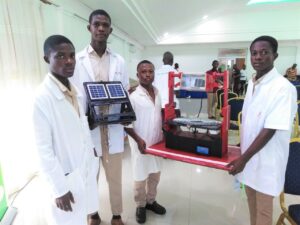GSTS project on renewable energy wins southern zonal competition
 The Ghana Secondary Technical School (GSTS), has won the southern zonal competition of the third edition of the Energy Commissions’ Senior High Schools Renewable Energy Challenge, in Kumasi.
The Ghana Secondary Technical School (GSTS), has won the southern zonal competition of the third edition of the Energy Commissions’ Senior High Schools Renewable Energy Challenge, in Kumasi.
The school won with a total of 80 points.
The ‘Giants’, presenting a project on ‘Tescan Smart Solar Oven,’ explained how the environmentally friendly prototype device meant for the hygienic preservation of food, was designed, and developed using local materials.
In all, eight schools participated in the zonal competition under the theme: “Clean Cooking and Food Processing Using Renewable Energy Technologies.”
The participating schools were awarded marks based on project ideas, innovation, environmental and social impact, objectives and challenges, why the implementation of the novelty is important and its relation to renewable energy.
GSTS, representing the Western region, took home a plaque, certificates, branded T-shirts, and some souvenirs provided by the Energy Commission, organisers of the Challenge, with support from the Ghana Education Service (GES).
The Yaa Asantewaa Senior High School (SHS), representing the Ashanti Region, placed second with 79.3 points, while Kpedze SHS (Volta Region) finished third on 74.2 points and were both presented with certificates and souvenirs.
The first three schools have all qualified for the grand finale of the competition, which aims to promote the efficient use of renewable energy resources and technologies.
Other participating schools were the Presbyterian Boys’ SHS (Greater Accra Region), Bueman SHS (Oti Region), Mfantsiman Girls’ SHS (Central Region), Mamfe Methodist Girls’ SHS (Eastern Region) and St. Joseph SHS (Western North Region).
Mr. Kofi Agyarko, Director, Renewable Energy and Energy Efficiency Directorate of the Energy Commission, in an address, said the underlying objective of the competition was to harness the creative thinking ability of the students.
It also sought to provide mentorship to the youth to be innovative and strive to find an antidote to the development challenges impeding society’s growth.
“It is vital that we eliminate the ‘chew, pour, pass and forget’ phenomenon in the educational system of Ghana and promote the practical application of theoretical knowledge,” the Director observed.
Ms. Olivia Serwaa Opare, Director, Science Education Unit of the GES, affirmed the resolve of the authorities to advance science, technology, engineering, and mathematics education.
This, she said, was critical to nurturing the needed future scientists capable of spearheading Ghana’s development agenda.
The programme was sponsored by the GIZ, an international development organization, Clean Cooking Alliance, Volta River Authority, Bui Power Authority and French Development Agency (AFD).
According to the organisers, there was an arrangement with the Council for Scientific and Industrial Research (CSIR) as well as the United States-based Clean Cooking Alliance to develop and improve on some of the projects presented by the students to become commercially viable.
Source: GNA
